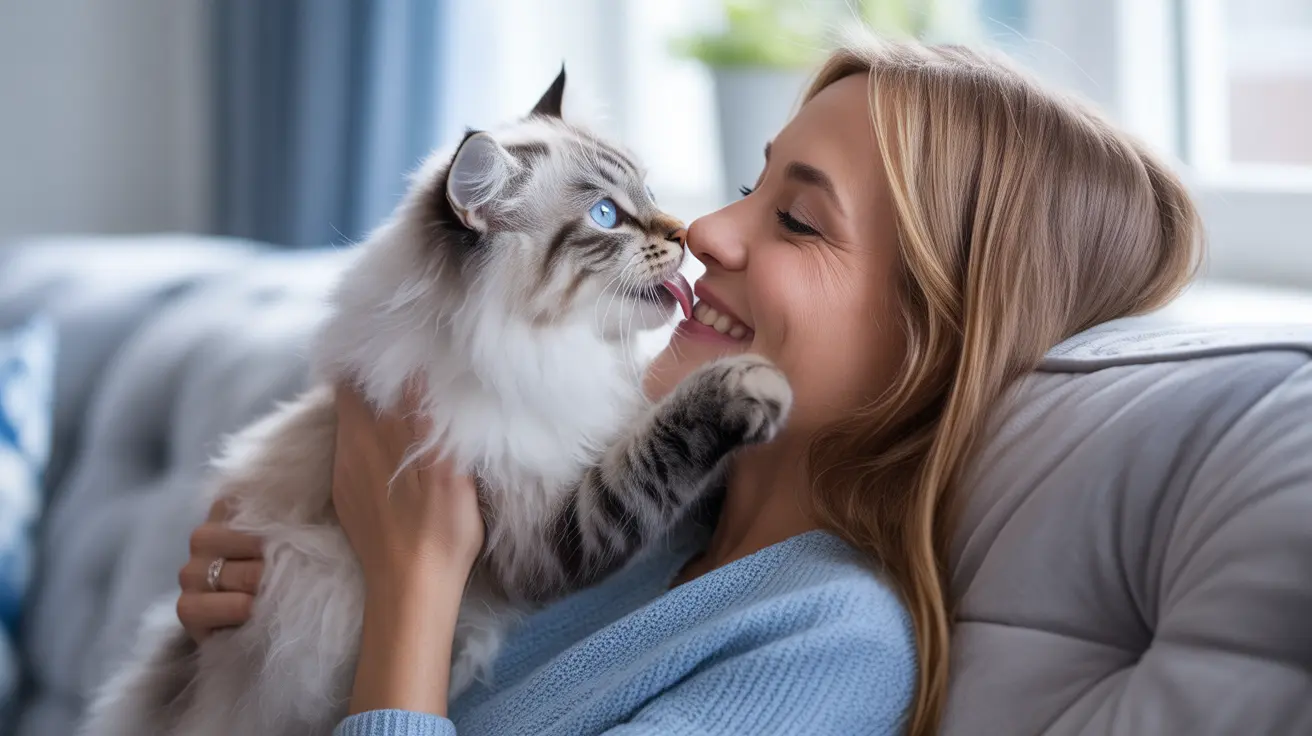If you've ever wondered why your cat licks your lips, you're not alone. This peculiar behavior is actually quite common among our feline friends and can signify various things, from affection to attention-seeking. Let's explore the fascinating reasons behind this behavior and when it might signal something that needs attention.
Understanding why cats lick their owners' lips requires insight into both feline social behavior and their natural instincts. While it might seem strange to us, this behavior is deeply rooted in cats' social bonding mechanisms and communication methods.
The Social Significance of Lip Licking
Cats use licking as a primary form of social bonding, known as allogrooming in the feline world. When your cat licks your lips, they're essentially treating you as part of their family group. This behavior mimics how mother cats groom their kittens and how cats in social groups maintain bonds with each other.
The act of licking also serves as a way for cats to mark their territory with their scent. When your cat licks your lips, they're leaving their unique scent signature, effectively claiming you as part of their social circle.
Medical and Behavioral Reasons for Lip Licking
Self-Licking Behaviors
When cats frequently lick their own lips, it could indicate several underlying issues:
- Dental problems or oral discomfort
- Nausea or digestive issues
- Stress or anxiety
- Recent meal cleanup
- Foreign objects stuck in teeth
Why Cats Target Human Lips
There are several specific reasons why cats might be drawn to licking their owner's lips:
- Attraction to food residue or salt on human skin
- Seeking attention or interaction
- Showing trust and affection
- Comfort-seeking behavior
- Marking territory through scent
When to Be Concerned
While lip licking is often normal behavior, certain patterns might warrant attention:
- Excessive or compulsive licking
- Accompanied by drooling or bad breath
- Changes in eating habits
- Signs of oral pain or discomfort
- Behavioral changes or increased anxiety
Creating Healthy Boundaries
If your cat's lip-licking behavior becomes excessive or concerning, consider these management strategies:
- Establish consistent feeding routines
- Provide alternative forms of attention and affection
- Regular veterinary check-ups
- Environmental enrichment to reduce stress
- Positive reinforcement training
Frequently Asked Questions
Why does my cat lick my lips after I eat?
Cats are naturally curious about food smells and tastes. When they lick your lips after you eat, they're likely interested in the food residue and investigating the new scents and flavors.
Is it normal for cats to lick their owner's lips as a sign of affection?
Yes, it's completely normal. This behavior is a natural expression of trust and social bonding in cats, similar to how they groom other cats they consider family.
Could my cat licking its own lips mean it has dental or health issues?
Frequent lip licking can indeed signal dental problems, nausea, or other health issues. If this behavior is excessive or accompanied by other symptoms, consult your veterinarian.
Why does my cat lick my lips and then bite me sometimes?
This combination of licking and biting is often called "love biting" and is typically a form of social play or attention-seeking behavior. However, it can also indicate overstimulation.
When should I be concerned about my cat's excessive lip licking behavior?
Be concerned if the behavior is sudden, excessive, or accompanied by other symptoms like decreased appetite, drooling, or behavioral changes. These could indicate underlying health issues requiring veterinary attention.
Understanding why your cat licks your lips can help strengthen your bond and ensure their health and happiness. While usually harmless, being aware of changes in this behavior can help you catch potential issues early and maintain your cat's wellbeing.






